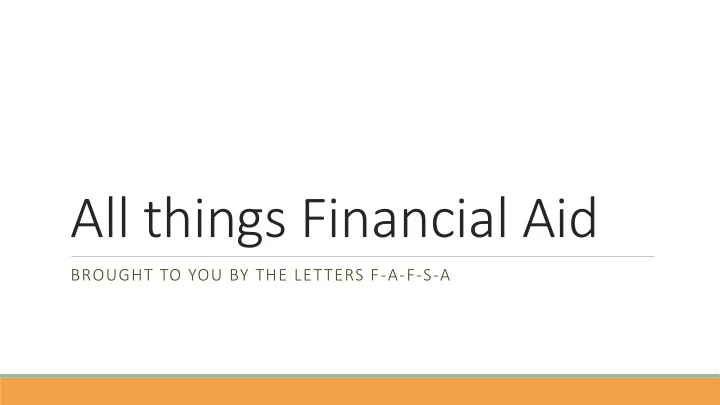

All things Financial Aid BROUGHT TO YOU BY THE LETTERS F-A-F-S-A
Goals To make you love us Introductions, Liaisons, Contacting Us Discuss the particulars of SAP and Academic Plans Census Date Repeated Coursework SULA (a four letter word in our office)
Liaisons ~ Who To Reach Out To and When NAMES, EMAILS, DEPARTMENTS RULES OF DIRECT REFERRALS
Huong Bui Grad Assistant huongbui@uwm.edu X 7240 Fee Deferments
Cesilia Gonzalez Grad Assistant cesilia@uwm.edu X7239 Fee Deferments Hispanic Presentations Casa Abierta
Ian Hoeffler ith@uwm.edu X5392 Flex Program SSC
Katrina McGann ktmcgann@uwm.edu X6361 Nursing African American Student Advising Life Impact Program Student Accessibility Center American Indian Student Advising Helen Bader School of Social Welfare Mapworks
Megan Poytinger Horvath3@uwm.edu X5436 Neighborhood Housing Norris Health Center AOC, Trio, Pre-college Southeast Asian Advising School of Education ACN
Greta Pano gvoltz@uwm.edu X2911 Parent Orientation Engineering and Applied Sciences College Connection Wisconsin Covenant Information Studies Letters & Sciences
Cindy Reindl Careindl@uwm.edu X6395 Center for International Education Honors Program Children’s Center Peck School of the Arts Architecture and Urban Planning TASO
Ivonne Rodriguez rodrigui@uwm.edu X3190 Health Sciences School of Business School of Public Health AOC, Trio, Pre-College Roberto Hernandez Center Dept. of Vocational Rehab
Triena Bodart tbodart@uwm.edu X2404 Bursar’s office Dean of Student Life Admission for Undergrad and Graduate Schools EMBA Orientations Presentation Requests
Reaching Out To US Direct referral to your liaison in crisis situations General questions should be sent to our office Consider: 5 full time staff and 4 grads (grads at 20 hours per week) for 25,000 students Return timeframe for calls and emails minimum of 24 hours Exceptions: First week of any semester Helpful if you coach the student on what they should ask We would love to come to staff meetings or provide presentations
The Nitty Gritty
SAP (Satisfactory Academic Progress) Provides contextual and specific guidelines to the expectations of completing a degree Provides an opportunity for early intervention Prevents over-borrowing Encourages graduating prior to depletion of funding sources 2 reasons a student may not be meeting SAP: Qualitative : Pace = (Completed Credits/Attempted Credits) must be above 66.67% Quantitative: Timeframe = 180 credits to complete a degree (Both include classes that the student may have paid for with means other than Financial Aid)
Example: Student started Fall with 59 attempted credits, and 40 completed credits. Student was enrolled in 15 credits but only completed 9 credits. • Is the student within his Timeframe? Student has 180 credit maximum to complete undergraduate program. Student is currently at 74 (59+15) attempted credits. Student is okay with timeframe (within 180 credits). • Does the student meet Pace? o Pace prior to Fall semester: 40/59=67.80% o Pace after Fall semester: 49/74=66.22% ◦ Completed: 40+9=49 ◦ Attempted: 59+15=74 ◦ Student is NOT making Pace. Must be 66.67% or above cumulatively ◦ Student will be automatically placed on Financial Aid Warning Status PACE IS CUMULATIVE! It does not matter that the student completed 9 of 15 for the Fall semester
Elements Affecting Timeframe and Pace All of the following are counted attempted and completed credits in the pace (%) and timeframe totals: ◦ Transfer credits ◦ Remedial credits ◦ Repeated courses ◦ Incomplete courses ◦ Withdrawals ◦ Consortium credits ◦ Study Abroad credits ◦ Changing Majors
Academic Plans The plan can only include credits necessary to complete their first degree Cannot include minors, certificates, or second majors Sticking to it You can’t change the plan without completing a new appeal with new reason and documentation Intent is to ensure students can quickly complete degree with only necessary coursework Must enroll for the exact number of credits and must successfully complete 100% of them You cannot appeal because of double majors Only allowed to receive Pell for first degree Details and critical factors Each semester counts whether the student enrolls or not Even if the student pays for it out of pocket You must include remedial classes on plan
Academic Advisement Reports (AARs) What do we use it for anyway???? Our attempt to reduce your workload Thoughts on making that more impactful or reasonable?
Census Date, Dropping/Adding and Withdrawing 10 th Day of classes is Census Date This is the date we hold students accountable for their credit level Students need to be cautious of dropping and adding classes Withdrawals Impact 60% of Semester Fall and spring are typically in the 11 th week of classes
Minimum Credits to Receive Aid UNDERGRADS ARE REQUIRED TO TAKE 6 CREDITS GRADUATES ARE REQUIRED TO TAKE 4 CREDITS • This is true in Fall, Spring and • This is true in Fall, Spring and Summer semesters Summer semesters Excludes repeated courses Excludes repeated courses • Exception for students who are • Exception for students who are Pell eligible in a Preliminary or Dissertator Status.
Aggregate Limits to Funding These are cumulative nation wide limits which include funds students received at other institutions. Pell 600% Undergraduate Limits for Subsidized $23,000 Undergraduate Limits for Unsubsidized $8,000 for dependent students and $34,500 for independent students Cumulative totals for Dependent students = $31,000 and Independent Students = $57,500 Cumulative totals for Graduate students include undergraduate loans and cannot exceed $135,000 There is no appeal to expand loan or grant limits Subsidy Limits (SULA) Declaring and changing majors can affect a student’s reported information
Repeated Coursework There is a limit as to how many times we may pay for coursework students repeatedly take: Financial aid may pay for students repeating coursework if they repeatedly fail the course. Once a student passes a course (D- or better), they may only receive aid for it once more. Students will be notified they will not receive aid for coursework Must be enrolled for a minimum of 6 other eligible credits as UG Must be enrolled for a minimum of 4 other eligible credits as Grad
Questions?
Recommend
More recommend